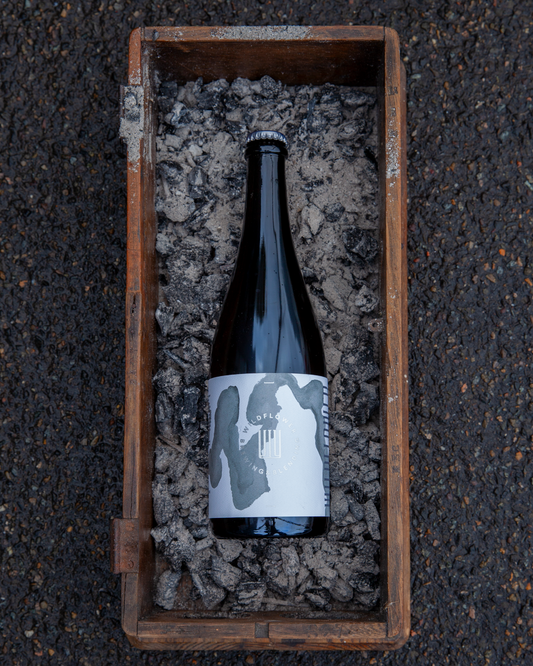We are excited to announce that Wildflower Waratah will be available at our cellar door and online (at 9am) on Saturday 21, October 2017.
Waratah is a collaboration between Ryefield Hops (Bemboka, NSW), Voyager Craft Malt (Whitton, NSW), Batch Brewing Co (Sydney, NSW) and Wildflower Brewing & Blending. To our knowledge, Waratah is the first commercially available beer made entirely of New South Wales ingredients.
We were approached to make this beer by Stu Whitcross of Voyager Craft Malt. He put us in touch with the team at Ryefeld hops, a burgeoning hop farm in Bemboka, Southern NSW. We had hoped sometime in the future to make a beer with entirely NSW ingredients, but thought it was years off. With the rate that the Craft beer industry is growing and the trend to move away from commodity based raw materials, we were pleased to learn of the plans at Ryefield.
In many ways, Waratah epitomises our goals here at Wildflower. Firstly, it is an agrarian beer, a product of the harvest conditions of each of the inputs. The recipe was built on what was grown here not on what we could order from international malthouses and hop fields.
Secondly, it expresses the flavours of a wild saccharomyces fermentation. So often when we think of 'wild yeast' only contaminant species come to mind like brettanomyces, pediococcus and lactobacillus. However, when we foraged for and captured yeast for our own house culture from the wild, we also caught a bunch of saccharomyces strains. We love the idea of playing with and expressing these flavours more often in the future as we do not feel that each and every mixed culture beer ought to be bracingly sour. Pre-industrialisation of beer and largely monoculture fermentations, brewers had developed practices to make relatively clean beer with wild-caught saccharomyces. We believe that this often gets overlooked when modern day rustic beers are made again.
Lastly, this beer is a celebration. A celebration of friendships new and old, of a successful first harvest for the first commercial hop farm in NSW and of the growth of an industry. Beer is a beverage made for social gatherings and to share with friends. It is not pretentious and coveted. We love beer's place in society and a beer like Waratah helps remind us that it is really just beer at the end of the day.
Waratah was brewed at Batch Brewing Company on 18 July 2017. Its grains were grown and malted in NSW by Voyager Craft Malt. In the boil we used Cascade and Fuggle hops grown and dried in Bemboka, NSW by Ryefield Hops. The wort was transferred to Wildflower where it underwent primary fermentation in stainless for 5 days.
The yeast we pitched was different than our usual house culture, which includes a strain native to Belgium. Instead, for Waratah we pitched a happy culture of yeasts that we had foraged from here in NSW. Since from when we started, we have kept the two cultures separate (the house culture and our native culture). Waratah is the first beer we have released made with only the native culture.
After primary fermentation, the beer was transferred into a single 500 l puncheon where it aged and conducted complex fermentations for 12 weeks. On the 13th week, we dry-hopped the puncheon with the last of the Cascade we had received from Ryefield. The hops steeped in the puncheon for another week before we packaged it on 12 September.
Tasting Waratah you can expect Fuggle hop spice aromatics of fennel and herbs de Provence combined with Cascade grapefruit notes. These give way to hints of cut hay and raw barley that provide an intensely lifted and expressive nose.
The palate is concise, yet defined. Earthy summer fields and clean citrus lines create a wonderful refreshing palate with complementing funk providing weight and depth.
The base beer is brewed entirely with New South Wales cereals, hops and yeast: Single Origin (S.O.) Riverina grown Schooner barley and Janz S.O. raw wheat from Voyager Craft Malt. S.O. Cascade and Fuggle hops grown in Bemboka, NSW. Finally, it was fermented with our native culture of foraged wild yeast and naturally occurring souring bacteria native to New South Wales. It was bottled on September 12 2017 and naturally conditioned through refermentation for 5 weeks. At bottling it was 5.0% ABV, 23 IBU and 1.5°P (FG= 1.006 SG).
Like all our beers, Waratah is best enjoyed when decanted off a settled natural yeast sediment at cellar temperatures (10-12°C).
We lastly want to extend our deepest thanks to everyone who has collaborated or contributed to this project. Most specifically, Stu who had the idea and pushed us to use our native culture to make a truly state grown beer. We are looking forward to next year's hop harvest and making this beer with friends once again.
best,
topher boehm



